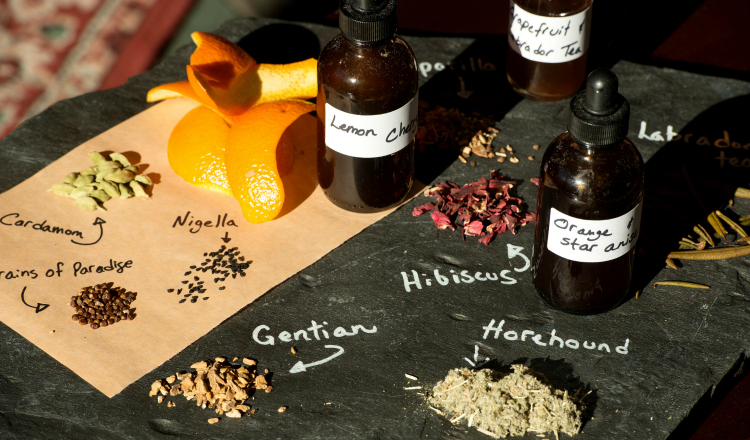Photo: David Buzzard – media-centre.ca (Getty Images)
Talking about the difference between bitters and amari is like chatting about the differences between bourbon and whiskey. All bourbon is whiskey but not all whiskey is bourbon. Just like all amari are bitters, but not all bitters are amari. Both use similar ingredients like bark, various herbs, botanicals, and spices to create bitter and semisweet flavors. The only clear difference is bitterness content. Amaris tend to be sweeter and easily enjoyed on their own while bitters are (you guessed it) more bitter and are more often mixed into a cocktail (like a Negroni).
Take it from these guys: Bitters Are Big Business for Bittercube Founders
Bartender approved: 8 Cocktails Bartenders Order On Their Night Off
Follow Mandatory on Facebook, Twitter, and Instagram.
Bitters and Amari
-
Meet The Amaro

Even though amari (plural of amaro) are bitter, they get their own designation because they aren’t so bitter so as to make them unpalatable on their own. These bittersweet Italian aromatics have herbal qualities and are usually enjoyed on their own as a nightcap or an after-dinner digestif. Amari are a class of bitter liqueurs originally from the Amalfi Coast in Italy. “Unlike cocktail bitters such as Angostura, amari are considered potable, but they still remain under the 'bitters' umbrella,” says Max Lent from The Baltimore Spirits Co.
Photo: MrKornFlakes (Getty Images)
-
Bitter Liqueurs Have A Particular Time And Place

Bitter liqueurs are an Italian aperitif. “Unlike vermouths, which are wine-based, bitters are alcohol-based and a part of the spirits category,” says Fabio Raffaeli, North American brand ambassador for Martini & Rossi. By the EU legal definition, they have a minimum ABV of 15 percent and are infused with botanicals that deliver the authentic bitter taste that helps to "open up" the stomach before meals. This is a major difference between bitters and Amari as bitters are supposed to be enjoyed before the meal.
“They may be enjoyed with ice, on the rocks, or in cocktails,” says Raffaeli. “They are different from cocktail bitters, which possess a much stronger flavor, higher alcohol strength, and are typically doled into drinks by drops, not the ounce.
Photo: Tatiana Suyarova (Getty Images)
-
Well-Known Brands

Fernet-Branca is one of the most well-known brands in the world. It’s also a favorite of bartenders. “Fernet-Branca is known as the ‘bartender’s handshake' because it is so popular among mixologists,” says Ryan Schaeffer, cocktail curator at JoJo’s Milk bar in Chicago. Other amaris include Lucano, Averna, Montenegro, and Amaro Braulio. Campari is probably the most well-known bitter liqueur in the world and the base (along with gin) for the beloved Negroni cocktail. Others include Martini & Rossi, Cynar, and Aperol.
Photo: Rafa Elias (Getty Images)
-
Medicinal Properties

Amari were developed over many millennia, evolving into a drinkable and enjoyable remedy or supplement for many ailments, much like teas today. “The barks and roots containing high levels of quinine assisted in fighting off malaria while other ingredients assisted in the rectification of the immune system,” says Jonathan Fasano, portfolio manager at Don Ciccio & Fasano.
Bitter liqueurs have a long and established history. “From harnessing their healing properties as an ancient medicinal aid to becoming a fashionable, enjoyable accompaniment to social occasions in the 19th Century, bitter flavors have won the world over,” says Raffaeli. Originally used for their medicinal effects to cure such things as snake bites and wounds in the mid-1800s, these remedies inspired the creation of the modern bitter liqueurs.
Photo: Justin Tsucalas (Getty Images)
-
Don't Fear The Bitter

The bitterness of any given bitter liqueur varies, but most of them aren’t really too bitter at all. While bitter liqueurs tend to have less sugar, that shouldn’t stop you from trying them. There are so many approachable amari in the world. “You don't have to start with the real pallet cleansers like Fernet or Campari,” says Lent. “Try a little Montenegro for an approachable citrus kick or the Baltamaro Szechuan for something new-world and out of the box.”
If you're not feeling up to sipping neat, look up some cocktails. “Most amari widely available will have lovely cocktails available for recreation on their website,” he adds.
“We tell people who are intimidated by the idea of drinking something bitter that a scale or range of bitterness exists,” says Fasano. “No two amari are created equal and there is something for everyone out there, whether you like very little to no bitter or the bitter extreme.”
Photo: Alexander Spatari (Getty Images)




